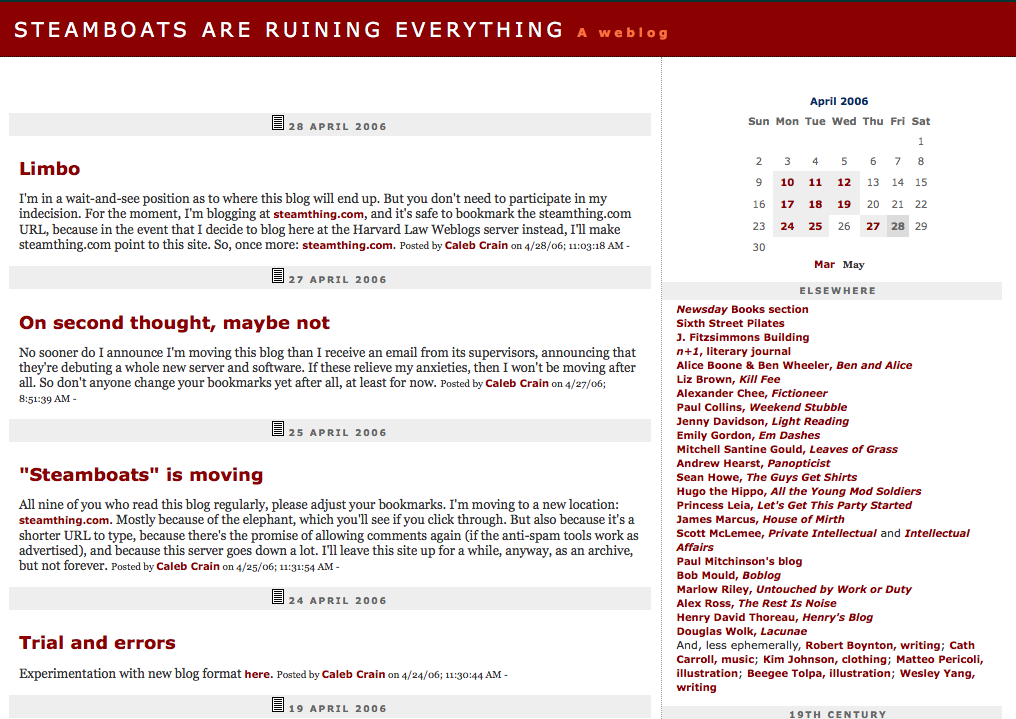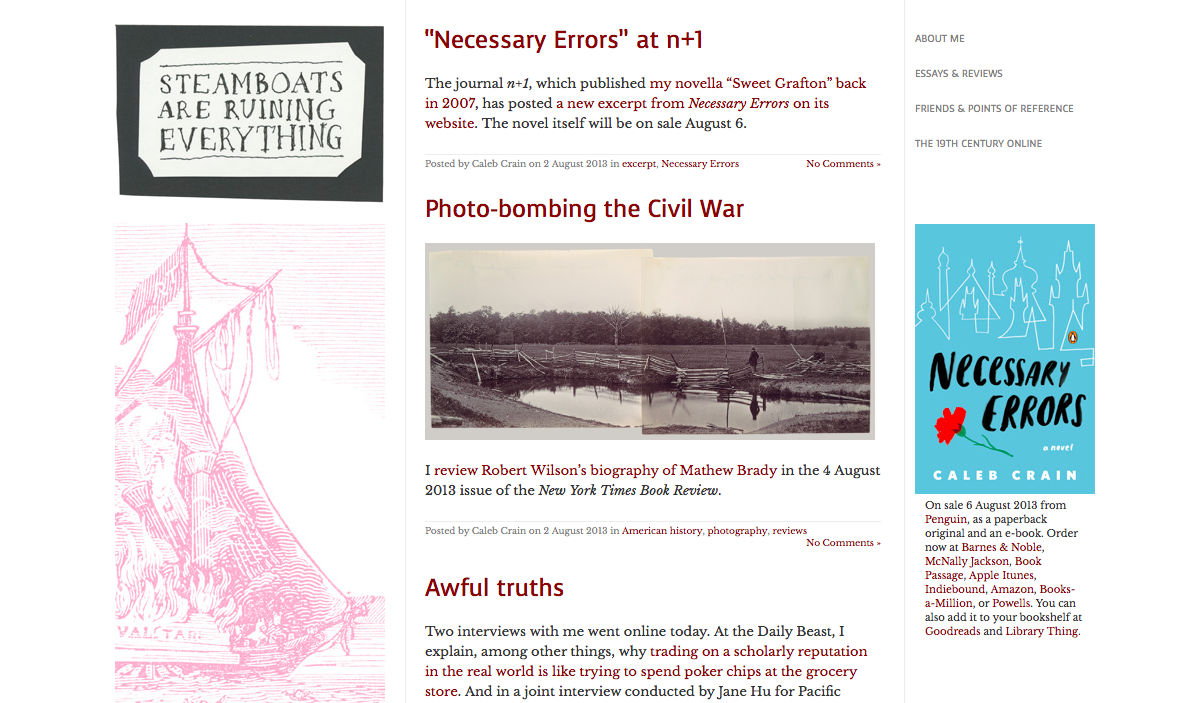Why did blogs die? If, that is, it can even still be remembered that once they were alive. I’ve been meaning to write a blog post on this since back when they’d only been dead a year or two.
I remember thinking that they had definitively died when Andrew Sullivan gave up on the monetized version of his longtime blog The Daily Dish. If anyone were going to make a financial go of blogging, it would have been him. That he couldn’t seemed final.
But I suspect that the process of dying began much earlier. It seems almost too obvious to finger social media as blogging’s killer, but sometimes the obvious happens to be the case. Back when blogging still seemed comparatively healthy, I remember resenting terribly the little “Share This” buttons that all my colleagues in blogging began to place at the end of each post. There was one little button for Facebook, then another for Twitter, then another for Stumble Upon, then one for Reddit, et cetera until every post in the blogosphere seemed to be staggering under a Lilliputian colony of parasitic buttons, like an immune-compromised deer studded with ticks. The blackmail was straightforward: If you didn’t add the little buttons to your posts, then fewer people would share your posts, and fewer people come to your blog. If you did add them, however, you were giving free advertising to the big social media sites, which some day, everyone knew, were going to ingest into themselves, macrophagically, the impulse for self-expression that had once gone into blogging, where at least it seemed to have some independence.
The poisoned bait of social-media traffic weakened the herd of bloggers, but it didn’t quite constitute a cull. The cull came as a reflected blow. Since the dawn of blogging, even Luddite bloggers like me had had little hit counters, where we could track how many visitors came to our site. One week—I’m sorry I can’t remember when; all I know is that it was more than a decade ago, and less than two decades ago—I watched my hit counter as the daily population of visitors to this blog drained away, steadily. Google had adjusted its algorithm, I soon discovered. Previously, when you had searched Google for, say, “gay cannibalism” or “does television impair academic performance,” the results had been ranked according to how many times your website was linked to by other websites concerned with the same topic, and this ranking had been more or less independent of time. On social media sites like Facebook and Twitter, however, the newest information was always at the top, and people seemed to prefer seeing newer content first, even if older content was more pertinent to their interest, or more rich in information and context. Under the pressure of competition, Google rejiggered its ranking, and overnight, it, too, began to discount heavily for time. A blogger who only posted a few times a month was doomed. Over the course of one fateful week, my visitors dropped away, day by day, as Google’s rankings of the pages on my blog were quietly recalculated. The crowd never returned. The same shrinking was no doubt inflicted across the blogosphere. One’s only recourse was to post more content, faster! But the sweat-shopping of oneself can only be carried so far, and the psychological costs of trying to always have the latest, hottest take probably aren’t worth bearing.
It was nonetheless still possible, even after this cull, for a blogger to soldier on, less read but still not yet completely unread. In a way there was even liberation in knowing that one had lost most of one’s audience. One could at last delete the little “Share This” buttons (which I had eventually given in to) without a sense of loss. Henceforth one was writing only for the diehards, for those who were committed, like oneself, to keeping themselves carefully impervious to the latest attention-manipulating software. The few, the proud, the Web 1.0.
Then came the coup de grâce: they offered to pay bloggers.
In a recent essay on economics and virtue for the TLS, Antara Haldar explains the paradox:
People often act in ways that conventional economic theory finds hard to predict. Examples range from people, paradoxically, donating less blood when they start being paid to do so, to parents leaving their children at a daycare centre longer after fines are imposed, to firefighters starting to take more leave when financial penalties are introduced. This is referred to as “crowding out” – when an interaction becomes transactional it ceases to engage people’s finer feelings.
Even blogging, unedited and unexamined as it is, or anyway as it’s supposed to be, takes time and energy, even for those of us who are logorrhific and heedless. It’ll probably take me a few hours to fritter awa artfully compose this elegant essaylet right here. If I understand the purpose of my blogging labor as giving an important Truth to the people, or expressing an inner Feeling, in a way that’s somehow beyond price, then it may seem to me that it’s worthwhile to contribute this labor despite knowing that I could have instead spent my time finishing a Kawabata novel, or abating the deterioration of my middle-aged body at the gym, or surfing online for the optimal squeaky toy for my cognitively-declining geriatric dog, who needs focus now more than ever. However, once I’ve written such a post, if I know that the New Yorker, the New York Review of Books, or the Paris Review might be willing to pay for it, how can I not try to sell it to them? Even if I claim that in the domain of blog posts I don’t care about money, surely I care about readers, and an established media company can put my post in front of many more readers. Once the legacy media companies added blog portfolios, I found myself with a new habit: whenever I wrote a post (unless it was on its face completely bonkers, like this one), I hesitated before hitting the “Publish” button, and at the last minute sent an email to an editor, who nine times out of ten agreed to buy what I had been thinking of as a throwaway, anyway. I had to be willing to eighty-six a couple of my dollar-and-a-half vocabulary words and prune a supererogatory paragraph here and there. But that was for the best, too. It was all for the best: free money, free editing, more readers. The trouble was, then I knew. I knew the dollar figure that the market put on the time and energy behind my blogging. Maybe I was still donating a Truth, or expressing a Feeling, and maybe the value of those contributions were still beyond price. But part of my blog post had been priced, and it seems impossible for a homo economicus to refrain from equating a price of a thing with the price of the whole thing. “When an interaction becomes transactional it ceases to engage people’s finer feelings.”
I still haven’t quite weaned myself, as you see. I kept this blog for years, and habit is almost as powerful as economic (mis)understanding.
I wonder what would happen if a newspaper were to leak the price, in pennies and dollars, of individuals’ social media feeds. To know how much effort to put into winning and keeping participants, companies like Facebook and Twitter must make such valuations. The prices probably aren’t too difficult to calculate. They’re also probably not very high…








